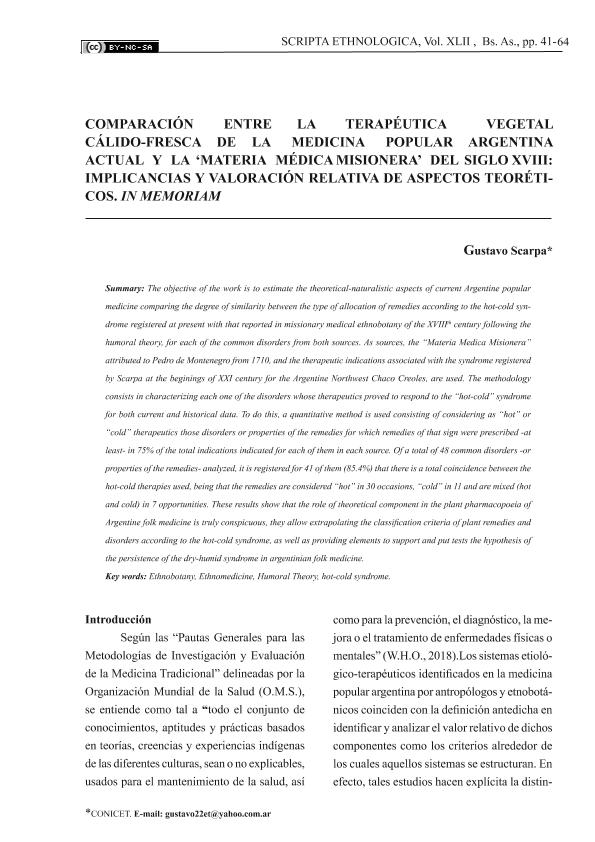Mostrar el registro sencillo del ítem
dc.contributor.author
Scarpa, Gustavo Fabián

dc.date.available
2021-11-12T10:32:49Z
dc.date.issued
2020-09
dc.identifier.citation
Scarpa, Gustavo Fabián; Comparación entre la terapéutica vegetal cálido-fresca de la medicina popular argentina actual y la "Materia Medica Misionera" del siglo XVIII: Implicancias y valoración relativa de aspectos teoréticos. In memoriam; Centro Argentino de Etnología Americana; Scripta Ethnologica; 42; 9-2020; 41-64
dc.identifier.issn
0325-6669
dc.identifier.uri
http://hdl.handle.net/11336/146769
dc.description.abstract
The objective of the work is to estimate the theoretical-naturalistic aspects of current Argentine popular medicine comparing the degree of similarity between the type of allocation of remedies according to the hot-cold syndrome registered at present with that reported in missionary medical ethnobotany of the XVIIIth century following the humoral theory, for each of the common disorders from both sources. As sources, the "Materia Medica Misionera" attributed to Pedro de Montenegro from 1710, and the therapeutic indications associated with the syndrome registered by Scarpa at the beginings of XXI century for the Argentine Northwest Chaco Creoles, are used. The methodology consists in characterizing each one of the disorders whose therapeutics proved to respond to the "hot-cold" syndrome for both current and historical data. To do this, a quantitative method is used consisting of considering as "hot" or "cold" therapeutics those disorders or properties of the remedies for which remedies of that sign were prescribed -at least- in 75% of the total indications indicated for each of them in each source. Of a total of 48 common disorders -or properties of the remedies- analyzed, it is registered for 41 of them (85.4%) that there is a total coincidence between the hot-cold therapies used, being that the remedies are considered "hot" in 30 occasions, "cold" in 11 and are mixed (hot and cold) in 7 opportunities. These results show that the role of theoretical component in the plant pharmacopoeia of Argentine folk medicine is truly conspicuous, they allow extrapolating the classification criteria of plant remedies and disorders according to the hot-cold syndrome, as well as providing elements to support and put tests the hypothesis of the persistence of the dry-humid syndrome in argentinian folk medicine.
dc.format
application/pdf
dc.language.iso
spa
dc.publisher
Centro Argentino de Etnología Americana
dc.rights
info:eu-repo/semantics/openAccess
dc.rights.uri
https://creativecommons.org/licenses/by-nc-sa/2.5/ar/
dc.subject
ETHNOBOTANY
dc.subject
ETHNOMEDICINE
dc.subject
HUMORAL THEORY
dc.subject
HOT-COLD SYNDROME
dc.subject.classification
Otras Humanidades

dc.subject.classification
Otras Humanidades

dc.subject.classification
HUMANIDADES

dc.title
Comparación entre la terapéutica vegetal cálido-fresca de la medicina popular argentina actual y la "Materia Medica Misionera" del siglo XVIII: Implicancias y valoración relativa de aspectos teoréticos. In memoriam
dc.type
info:eu-repo/semantics/article
dc.type
info:ar-repo/semantics/artículo
dc.type
info:eu-repo/semantics/publishedVersion
dc.date.updated
2021-09-07T18:07:56Z
dc.identifier.eissn
1669-0990
dc.journal.volume
42
dc.journal.pagination
41-64
dc.journal.pais
Argentina

dc.journal.ciudad
Buenos Aires
dc.description.fil
Fil: Scarpa, Gustavo Fabián. Consejo Nacional de Investigaciones Científicas y Técnicas. Oficina de Coordinación Administrativa Parque Centenario. Museo Argentino de Ciencias Naturales "Bernardino Rivadavia"; Argentina
dc.journal.title
Scripta Ethnologica
dc.relation.alternativeid
info:eu-repo/semantics/altIdentifier/url/https://www.redalyc.org/articulo.oa?id=14864828003
Archivos asociados
